❖ 𝐃igital 𝐎il 𝐏ainting 𝐄xperiments ❖
This tutorial reveals some eternal truths that 𝐞𝐯𝐞𝐫𝐲𝐛𝐨𝐝𝐲 𝐬𝐡𝐨𝐮𝐥𝐝 𝐤𝐧𝐨𝐰 but few have been heard of. In this October's Clip Studio Tips, I proudly present; the secret of Digital Oil Painting lies in the experiment of shapes.
I'll put this month's title as "𝐃.𝐎.𝐏.𝐄."
However, not everyone will get the meaning behind it and might be too short and ambiguous; so you could refer to the longer title above as 𝐃igital 𝐎il 𝐏ainting 𝐄xperiments. 😊
One a side note; me and my lovely future wife; Grace will share our thoughts regarding digital oil paintings with both of our skills combined and will happily share to you.
This whole tutorial is my experimental digital oil painting method using Grace's photo above from the basic of shapes. There will be lessons you'll need to read carefully, not just techniques with chosen tools. Only with default brushes, you can turn any photo into oil painting style!
❶ - 𝐀𝐫𝐭𝐢𝐬𝐭'𝐬 𝐁𝐞𝐬𝐭 𝐅𝐫𝐢𝐞𝐧𝐝
"𝑉𝑎𝑙𝑢𝑒 𝑑𝑟𝑎𝑤𝑖𝑛𝑔𝑠 𝑎𝑟𝑒 𝑎𝑛 𝑎𝑟𝑡𝑖𝑠𝑡'𝑠 𝑏𝑒𝑠𝑡 𝑓𝑟𝑖𝑒𝑛𝑑."
I still remember that insightful sentence coming from my visual art teacher back in my college. Although - at that time - I kind of wondering '𝑤ℎ𝑎𝑡 𝑡ℎ𝑒 ℎ𝑒𝑐𝑘 𝑎𝑟𝑒 𝑣𝑎𝑙𝑢𝑒𝑠 𝑔𝑜𝑜𝑑 𝑓𝑜𝑟?' and ignore the fact that later on; it will dramatically change my understanding and perspective as well as my traditional and digital painting progress.
As you might've seen from other tutorials (not just mine) which talking about value sketching, drawing, rendering, and so on; having exact tones at first will save you from frustration to drop color scheme.
▲ The tones of Grace's lovely head are demonstrated here with a simple three-value sketch. Although the finished piece has subtle accents, this drawing shows only the general values of the areas. There you see how dramatically the lights, mediums, and darks are separated; a reason why value drawings are one of the artist's best friends.
❷ - 𝐓𝐫𝐚𝐝𝐢𝐭𝐢𝐨𝐧𝐚𝐥 𝐀𝐫𝐭𝐢𝐬𝐭'𝐬 𝐓𝐡𝐨𝐮𝐠𝐡𝐭 𝐏𝐫𝐨𝐜𝐞𝐬𝐬𝐞𝐬
What does this digital oil painting portrait reveal to me?
She's at once, proud, amiable, inquisitive, shrewd, and doesn't suffer fools. Now, in truth, you may not have chosen those characteristics but once you've read them and have looked at Grace again, they might just suit you.
Similarly, your words could color my own feelings. Words carry weight in the world of paintings, at times quiet artfully.
I use some alphabetical symbols in my initial sketch from 🅐 to 🅖 so you could understand with my technical words which spread around the sketch to determine the values description.
Cast-shadow 🅐 flows into form-shadow 🅑. Cast shadows often have sharper edges than form shadows in the human head.
Although Grace is in repose, there is plenty of movement in the painting. The angles 🅒 and 🅓 work wonderfully against each other giving the portrayal visual activity.
The background has a subtle flourish with the dark areas 🅔. It grandly flows opposite to Grace's serape. It also echoes the rakish turn of the hat brim.
Frequently my visual art students simply place a dark smudge under the nose to denote a shadow. This drives me wild. That shadow always, always has a very specific shape as in 🅕.
The 🅖 is where the light touches on features that are in shadow areas. These can be very dramatic, but don't overdo or you will take away the integrity of the shadow.
❸ - 𝐓𝐡𝐢𝐧𝐤 "𝐒𝐡𝐚𝐩𝐞" 𝐍𝐨𝐭 "𝐒𝐮𝐛𝐣𝐞𝐜𝐭"
Here's the important message for your eyes only: 𝐨𝐮𝐫 𝐰𝐨𝐫𝐤𝐬 𝐚𝐫𝐞 𝐛𝐮𝐢𝐥𝐭 𝐮𝐩𝐨𝐧 "𝐚𝐛𝐬𝐭𝐫𝐚𝐜𝐭" 𝐬𝐡𝐚𝐩𝐞𝐬. These intriguing forms combine to give us mountains, mules, and mugs. Don't draw a nose or a rose, draw shapes, but first thoroughly understand those shapes.
You can't have more fun than interpreting nature while in the throws of making art. The rest of the world disappears.
▼ Using 𝐏𝐨𝐢𝐧𝐭𝐢𝐥𝐥𝐢𝐬𝐦 brush from 𝐎𝐢𝐥 𝐏𝐚𝐢𝐧𝐭𝐢𝐧𝐠 can also adds some fun while shaping.
▼ By itself you wouldn't understand below particular drawing. But as it relates to the rest of the painting, you have no doubt that it is the ribbon. It adds an enormous vitality and interest to the work and it contrasts wonderfully with her calming expression.
💡 Most importantly it lends power to the overall design of the painting. You can see that I didn't paint it in detail but was after its essence; that's all that is needed here.
Drawing the shape of the ribbon requires 'shaping' techniques by using standard 𝐆𝐨𝐮𝐚𝐜𝐡𝐞 default 𝐎𝐢𝐥 𝐏𝐚𝐢𝐧𝐭𝐢𝐧𝐠 brush (CSP 1.9.4). Remember, the important part lies in the making of the entire artwork with only 3 variants of brushing method as follows:

I. Start with a bold stroke, don't use too much pressure while brushing.
II. Add another stroke from different direction, don't try to blend it too much.
III. Using 𝐭𝐫𝐚𝐧𝐬𝐩𝐚𝐫𝐞𝐧𝐜𝐲 with 𝐂𝐨𝐥𝐨𝐫 𝐒𝐥𝐢𝐝𝐞𝐫 slightly to 'remove' some paint from different directions to achieve some dry paint/oil pastel look.

▲ Once I'm done with 𝐛𝐥𝐨𝐜𝐤𝐢𝐧𝐠 𝐢𝐧𝐢𝐭𝐢𝐚𝐥 𝐬𝐡𝐚𝐩𝐞𝐬 and values, I'm using a new layer then change its mode to 𝐎𝐯𝐞𝐫𝐥𝐚𝐲. Then start painting with colored version of Grace's skin.
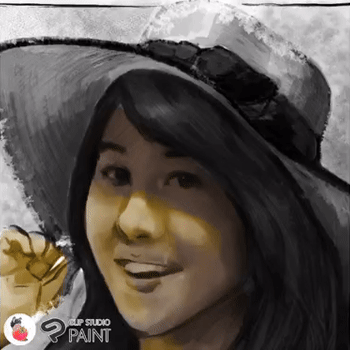
▲ After that, I create new layer sets with 𝐍𝐨𝐫𝐦𝐚𝐥 blending mode to add some lighter tones.
Remember to do abstract shaping even when you're on detailing mode. Abstract shapes begin with larger brush strokes.
💬 Around 40 minutes later...

▲ Using standard 𝐈𝐧𝐝𝐢𝐚 𝐈𝐧𝐤 → 𝐑𝐨𝐮𝐠𝐡 𝐨𝐫 𝐒𝐦𝐨𝐨𝐭𝐡, I start to paint more structural abstract strokes to add highlights for some area, especially hair and facial structure. Switch between 𝐆𝐨𝐮𝐚𝐜𝐡𝐞 to blend and remove some parts with 𝐭𝐫𝐚𝐧𝐬𝐩𝐚𝐫𝐞𝐧𝐜𝐲.
I 𝑐𝑎𝑟𝑒𝑓𝑢𝑙𝑙𝑦 𝑡𝑟𝑎𝑐𝑒 𝑡ℎ𝑒 𝑒𝑑𝑔𝑒 of the hairlines near the forehead and inside of the hat to capture the add some highlights between their color range. Always remember to put any additional and necessary highlights side by side with the darker tones to 𝑠𝑒𝑝𝑎𝑟𝑎𝑡𝑒 𝑡ℎ𝑒𝑖𝑟 𝑣𝑎𝑙𝑢𝑒𝑠.
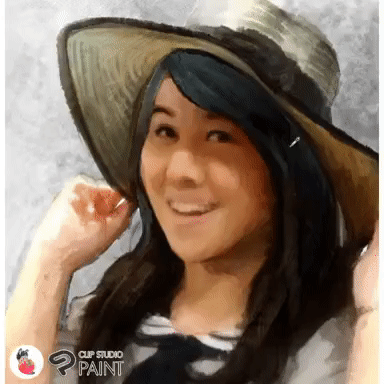
▲ Sometimes 𝐚𝐝𝐝𝐢𝐧𝐠 𝐬𝐩𝐞𝐞𝐝 𝐰𝐡𝐢𝐥𝐞 𝐩𝐚𝐢𝐧𝐭𝐢𝐧𝐠 or making a quick strokes; you wouldn't even know 𝑤ℎ𝑎𝑡 𝑠𝑢𝑟𝑝𝑟𝑖𝑠𝑒 you'll get with the result!
❹ - 𝐀𝐫𝐭 𝐂𝐨𝐧𝐧𝐞𝐜𝐭𝐬 𝐭𝐡𝐞 𝐒𝐮𝐛𝐣𝐞𝐜𝐭
▲ Yes, it seems messy! But it was fun to do everything in just 4 simple layers in order below:
🗋 Detail (normal mode)
🗋 Color layer (overlay mode)
🗋 Value layer (normal mode)
🗋 Sketch layer (normal mode)
Take a look and a pause on my speed painting above (around 40 mins). These elements are what Grace brings to the painting before I even initialize my idea to paint her digitally:
📌 A wonderful, positive, buoyant presence. She's bigger than life!
📌 A face with abundant natural character.
📌 A hat and uniform, that add enormously to the complete feel of the painting!

▲ Now, for the connection between the subject of painting (Grace) to her surroundings; I bring these thoughts of process:
📌 Experience using traditional oil painting and skills.
📌 A willingness to urge Grace to be completely at ease, spontaneous while taking a picture of her on a department store. (She was a bit shame to pose at first.)
📌 An insatiable curiosity and acute observation of digital tools to mimic traditional oil painting likeness. Massive hours of experiments during a whole month of creating this artwork plus video tutorials steps.
𝐀𝐥𝐰𝐚𝐲𝐬 𝐮𝐬𝐢𝐧𝐠 𝐥𝐚𝐫𝐠𝐞𝐫 𝐛𝐫𝐮𝐬𝐡 𝐭𝐨 𝐚𝐜𝐜𝐨𝐦𝐦𝐨𝐝𝐚𝐭𝐞 𝐭𝐡𝐞 𝐫𝐚𝐧𝐝𝐨𝐦𝐧𝐞𝐬𝐬 𝐨𝐟 𝐩𝐚𝐢𝐧𝐭 𝐬𝐭𝐫𝐨𝐤𝐞𝐬; I know, to be honest; it's kind of difficult to achieve traditional look if we blend every pixels in the end. There's no point of that!
▼ So, my only suggestion: 𝐭𝐫𝐲 𝐭𝐨 𝐥𝐞𝐚𝐯𝐞 𝐭𝐡𝐞𝐦 𝐛𝐞 𝐚𝐬 𝐦𝐞𝐬𝐬𝐲 𝐚𝐬 𝐢𝐭 𝐬𝐡𝐨𝐮𝐥𝐝 𝐛𝐞. Blending not always be the solution in the terms of creating digital oil painting artworks. Texturing is necessary, however with limiting my tools and not worry about texturing too much; I created valuable artwork that looks like oil pastel/painting in the end only with big brush strokes.
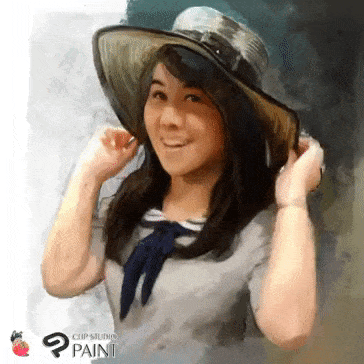
▲ What the viewer brings to the painting:
📌 At first, curiosity.
📌 Then surrender to the overall visual and emotional impression and sometimes, the technique.
📌 To some extent, resolution.
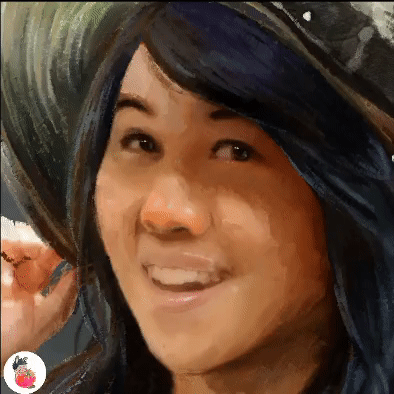
▲ Once you add some background painting with bluish paint, I occasionally apply that technique to the face. Or any other warmth color to balance out everything. I use 𝐋𝐢𝐠𝐡𝐭𝐞𝐫 𝐈𝐧𝐤 brush to blend everything smoothly.
❺ - 𝐀𝐟𝐭𝐞𝐫𝐰𝐨𝐫𝐝
I hasten to add that I am not psychoanalyzing Grace while painting her from the photo reference. I simply look at features and "record" them in my mind before transform values into blank digital canvas.
Her life has done all the work in making her an interesting and lovely subject; my job is to notice what her presence has to offer and combine it with my artistic approach.
It really boils down to that, the result; to be hoped; is a person that almost literally EXISTS within the digital oil painting itself.
Thanks for reading, I know this tutorial is far too simple compared to others, without too much tricks on my sleeves; but I humbly need you to understand this:
𝐄𝐚𝐜𝐡 𝐧𝐞𝐰 𝐝𝐚𝐲 𝐜𝐨𝐦𝐞𝐬 𝐰𝐢𝐭𝐡 𝐢𝐭𝐬 𝐩𝐫𝐢𝐳𝐞𝐬 𝐮𝐧𝐚𝐬𝐬𝐞𝐦𝐛𝐥𝐞𝐝. 𝐁𝐞 𝐡𝐚𝐧𝐝𝐲 𝐰𝐢𝐭𝐡 𝐲𝐨𝐮𝐫 𝐭𝐨𝐨𝐥𝐬.



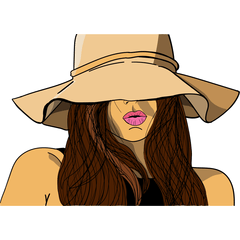


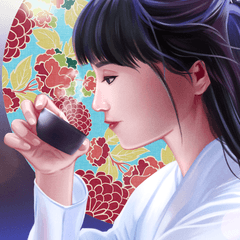














댓글